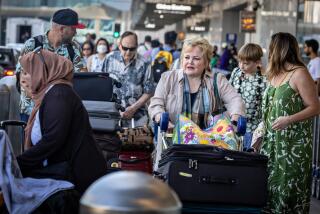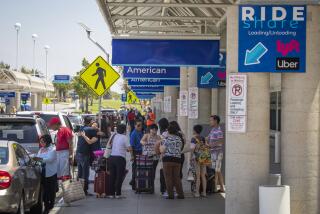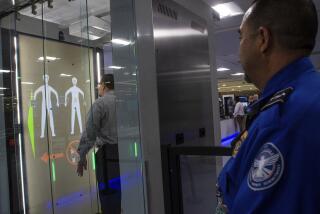Old Habits May Not Fly Under New Airport Rules
In the rushed âI-hate-to-waitâ world of frequent business fliers, last-minute laggards will have to start changing their ways.
âYour typical business traveler thinks they have it right when they arrive just 15 minutes before departure,â said Thomas Nulty, president of Associated Travel International, a Santa Ana travel agency. Try that now, warns Nulty, and âthey will probably get caught in some security [inspection] line and probably miss a flight.â
The adoption of tougher security measures at U.S. airports amid growing fears of terrorism will force many business travelers to change their long-held routines, travel experts say. Traveling on business will mean more planning and preparation as well as more time waiting in lines and at airport lounges.
Many business travelers--jittery after the recent crash of a TWA jumbo jet and Saturdayâs bombing in Atlanta--say the additional security is necessary. However, many are concerned that the new era of heightened inspections will add to the growing hassles and inconvenience that frequent fliers already complain about.
âMy partners were in a meeting this morning wondering why anyone would want to travel today,â said Los Angeles real estate developer Timothy H. Walker. As soon as you leave your home, âyouâre thinking about the obstacle course you have to get through to get on the plane.â
Airline industry analysts say the additional time required to pass through airport security will only serve to make business travelers--who account for more than 50% of airline revenues, according to industry estimates--think twice about taking their next trip. Ironically, the most recent time-consuming security precautions come as airlines have been touting efforts--such as so-called ticketless travel--to help travelers avoid lengthy waits at the airport.
Some travel agents said ticketless travel might have to be abandoned if passengers are required to show tickets before being allowed to enter an airport terminal. But no one--not even the airlines--is sure yet what changes are in store for air travelers. The governmentâs new security procedures are still being interpreted and implemented, and a set of potentially more disruptive measures are under consideration.
Allowing more time to travel has become much more important because of increased scrutiny paid to passengers and their luggage. On international flights, for example, passengers can no longer check in their baggage at the curb. They instead must go to the check-in counter.
At security checkpoints, guards will conduct more thorough searches of passengers, asking travelers to take out and turn on laptop computers and other electronic devices. At the boarding gate, passengers will have to show photo identification and be subject to further questioning. One banking executive was surprised when an airline employee recently asked to see the identification of his 2-year-old daughter as they boarded a flight.
The new security procedures have left many frequent business travelers wondering how much time to allow. âSometimes you are not quite sure how long it takes, and thatâs what causes more difficulty in planning,â said real estate consultant Dennis McEachern.
âI try to get there an hour before the flight leaves,â he said. âNow it might be an hour and a half.â
The most onerous new security procedure that could seriously disrupt travel requires an airline to make sure that each piece of baggage loaded on a plane can be matched with a passenger onboard a flight. The practice is not required on every flight but has become more commonplace, said travel executives.
During the last two weeks, David Ford, an executive with the Irvine-based Red Robin restaurant chain, has been on two flights--one domestic, the other international--in which the plane was forced to return to the airport after the bags and passengers were not fully matched. Despite the lost time and inconvenience, Ford isnât complaining.
âIt doesnât bother me,â said Ford, who heads the chainâs food and beverage operations. âI still think flying is one of the safest ways to go.â
More to Read
Sign up for The Wild
Weâll help you find the best places to hike, bike and run, as well as the perfect silent spots for meditation and yoga.
You may occasionally receive promotional content from the Los Angeles Times.






